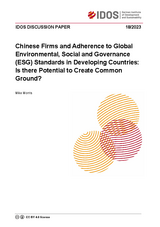Discussion Paper
Chinese firms and adherence to global ESG standards in developing countries: is there potential to create common ground?
Morris, MikeDiscussion Paper (18/2023)
Bonn: German Institute of Development and Sustainability (IDOS)
ISBN: 978-3-96021-221-8
DOI: https://doi.org/10.23661/idp18.2023
Price: 6 €
This paper focuses on analysing how Chinese firms operate in Latin America, Asia and Africa in regard to ESG (environmental, social and governance) standards and sustainability issues. How do they respond to the increasing global value chain requirement to incorporate and maintain ESG standards? Is their space for an alignment between Western development cooperation ESG policies, frameworks, strategies and practices and Chinese political and economic stakeholders in the developing world? The paper uses a variety of case studies covering Chinese firms (disaggregated into SOEs (state-owned enterprises) and large, medium and small private sector firms) operating in various sectors in countries across the developing world. It uses a three dimensional framework to analyse different types of Chinese firms in terms of value chain operations covering many of the ESG standards they are required to meet:
1. Supply chain relations (i.e. approach to supporting upgrading of local suppliers);
2. Internal firm processes (i.e. approach to local labour, training and upskilling);
3. Social licence to operate (i.e. approach to meaningfully engaging with local communities taking account of their social and economic needs).
There are examples of Chinese firms behaving according to the negative type casting that has dominated much of the literature. However, Chinese firms in developing countries are fairly flexible and more willing to adapt to ESG standards than conventionally assumed. There are sufficient instances of Chinese firms in host developing countries showing significant movement to alignment on ESG dimensions. Unlike the industrialised world, these firms are not driven by civil society socio-political pressure within China. China’s relationship to ESG has instead been driven by a) geo-political considerations involving the Chinese government’s global presence, and b) primarily economic risk considerations of Chinese lead firms operating internationally – risk relating to raising finance and ensuring that business operations in developing countries can avoid major disruption. For many Chinese lead firms operating in the developing world, ESG is increasingly being perceived as a fundamental risk mitigation tool assisting them to ensure that they are able to maintain continuous, consistent, and predictable economic operations. These tendencies can only be expected to grow much stronger as the Chinese government adopts more ESG standards within guidelines and regulatory frameworks and enforces compliance on Chinese firms operating abroad. As Chinese firms become more open to ESG compliance, this creates a foundation for potential development cooperation alignment with the Chinese government and Chinese lead firms operating in the developing world.
Contact
Cornelia Hornschild
Publication Coordinator
E-mail Cornelia.Hornschild@idos-research.de
Phone +49 (0)228 94927-135
Fax +49 (0)228 94927-130
Alexandra Fante
Librarian/ Open Access Coordinator
E-Mail Alexandra.Fante@idos-research.de
Telefon +49 (0)228 94927-321
Fax +49 (0)228 94927-130



![[Translate to English:] Photo: Alexandra Fante, Bibliothekarin/Open Access-Koordinatorin](/fileadmin/_processed_/f/0/csm__c_Deutsches-Institut-fuer-Entwicklungspolitik_Fante_94ce4fa1ba.jpg)